It's an honest question - why Wargames? What is it about this genre of game that involves tiny toy dolls, I mean, action figures , wait, I mean, miniatures that you have to put together and paint yourself that is so appealing? The hours...and hours...and hours....and the money you have to spend to start the hobby sometimes just feels like such a chore to finally get to the game play itself. Then you have to find someone else that is just as crazy as you to begin such an endeavor...
...so why is wargaming popular? Heck, why, when I can log online and immediately buy about, say, a dozen Steam sale games and start playing them in the same hour, would anyone want to play such an antiquated physical game? And why is the market for miniatures growing?
I find myself asking asking those questions sometimes. Usually while I'm getting horribly ruined as I try out that brand new team of miniatures I just spent 20 hours making sure looked perfect. Then, by the end of the night, I find myself remembering these key points:
It's how Books can be better than Movies
Remember that first time you opened up your favorite book? You know, that one book, with the really cool wizard/scientist/gunfighter/villain/detective? Or that one scene where everyone lives/everyone dies and its really tragic/bad ass? I do too, and I love it when my mind paints that scene in my mind in the coolest way possible...adding a backflip here, or an extra explosion there...
And I hate it when the movies get that perfect scene I've built up in my head wrong. When someone else tries to show how cool fighting zombies is, and just fails horribly. Or making Gimli more a chump than a bad ass dwarf.
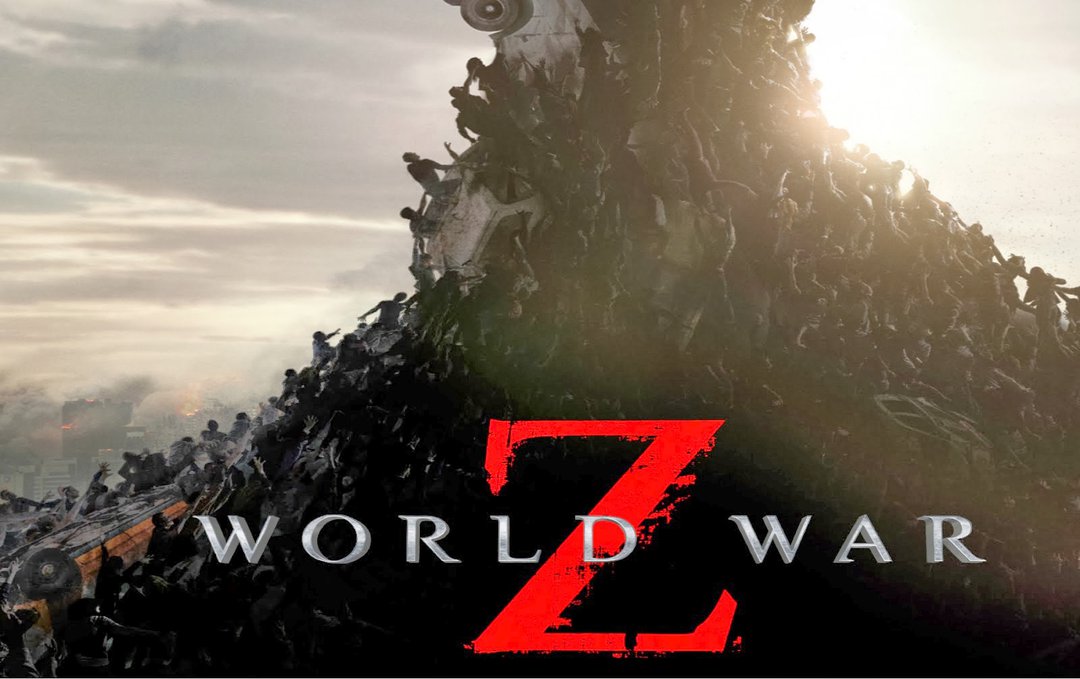
Or you can, you know, destroy any semblance of subplot ormeaning and just make a zombie thriller instead.
It can be a horrible downer, when that perfect, awesome thought you had is destroyed by another's attempt to make a visual copy. However, Wargames rather elegantly side-step this issue by playing both sides of the aisle. On one side, you have a visual representation, the miniature itself, as well as the artwork that can be found inside the codexes, character cards, and rule-books. If you are wealthy enough, or lucky enough to know someone that has a board set up, you can have nifty terrain to make the experience more complete.
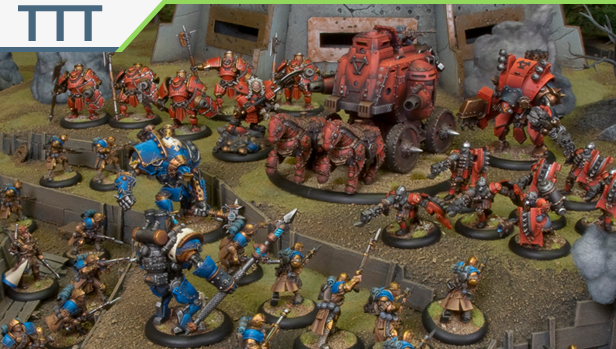
However, playing a miniatures game is sort of signing a contract with your imagination - you are playing a game about war, and yet we are using little pieces of metal and plastic to move and measure. We are nerdy demigods that can see the entire field of war, while each of our little miniatures might not be able to. Giant machines that belch steam and smoke and bullets just...sit there, inert. We understand instinctively that these miniatures are just symbols for the actual experience - just how our brain instinctively translates words into mental images when possible. Its how the board above suddenly looks like the epic battle below:
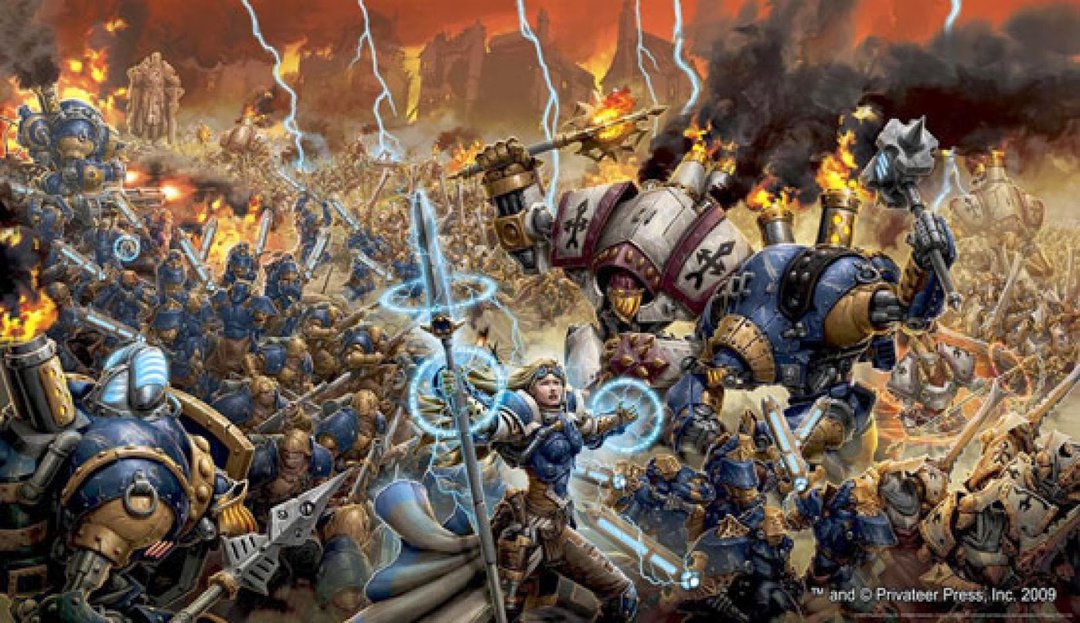
Yes, I know the first picture is Khador Vs. Cygnar, and this isCygnar vs. Menoth. I just couldn't find an artwork quiteas epic as this one.
It's a Tangible Hobby that involves You
Focusing on the tiny little figurines for another moment, lets talk about how much freaking dedication a Wargame needs in order to pay you back. Lets break it down into steps, very loosely, if this is the first time you ever get into a 'normal' Wargame (unpainted, unassembled miniatures) and want to get your own supplies.
- You purchase your first army or starter set for a team.
- You have to purchase a rule book or army list of some sort, so you have the basic rules of the game.
- Buy the basic equipment to play the game and get your miniatures together - this can mean a ruler, glue, paints, spray-paint, brushes, dice, cards....
- Find other people that play. Wait, maybe you should have done that before spending all this money...
- Learn how to play the game.
- Assemble EVERYTHING. Glue the parts together, create your army lists, make a gaming space (Even if just books and plates on a kitchen counter), paint everything, or at least try painting one of the miniatures to look like what its supposed to.
- Play the game for the first time. After finding someone to teach you, or another poor newbie like yourself.
- Be prepared to have a wallet if you start down the rabbit hole.

I said I would be honest with you - this is a game style youshouldn't enter lightly.
This level of dedication to a genre is absolutely bonkers by most gaming genre standards. For Dungeons and Dragons, you can usually tag along to a Local Gaming Store and jump in with your own basic handbook. A video game, you don't need to 'learn' the rules or buy them separately, that's what tutorials are for. Yet, this is part of the charm - how entirely you have to dedicate yourself to the creation of your own game. The closest thing I can attribute it to is being a Dungeon Master for an RPG, but this is definitely its own beast.
This is a genre that you get out exactly how much you put into it - Take anything from that list above, and you soon realize there is an infinite amount of ways to combine this. You can go into a new game with a group, as an example, something I did with two friends with the MERCS skirmish game. Between us, we have a game mat, four teams to play as, the rule-book, and enough terrain. Sure, our local gaming stores don't have this game yet, but it doesn't matter. We have a house, three people that really liked trying the game out with the developers, and chips and beer. Conversely, Malifaux is a game that very much is at the local gaming stores, and has a presence of a dozen to two dozen players. I'm fortunate enough to help run events for the game, as well as others, so I know that every Thursday, I can walk in with an army case and I can get a game in, and find others to talk shop about the game.
As for painting? Trust me, everyone starts off terrible, but the more you put into it, the better. Some people just glue the models together and play with them without paint - which you can in most places, just not for competitive stuff. Or you can spray paint them all one color and add a little detail. Or you can spend an hour...or three, on each little damn one of them, making them an individual work of art. Take this guy, for example:
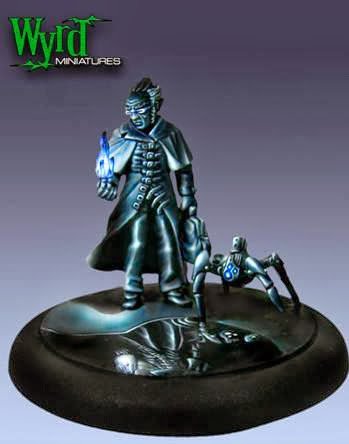
People kill for the ability to paint like this.
This is Ramos, the steam-punk sorcerer of my favorite little game these days... but that particular one isn't mine. No no, that...masterpiece, with the reflection, and the chosen ripple effect and... if I was that player, putting down this model would make me feel like I've already won. Of course, there's more than one way to skin a cat:
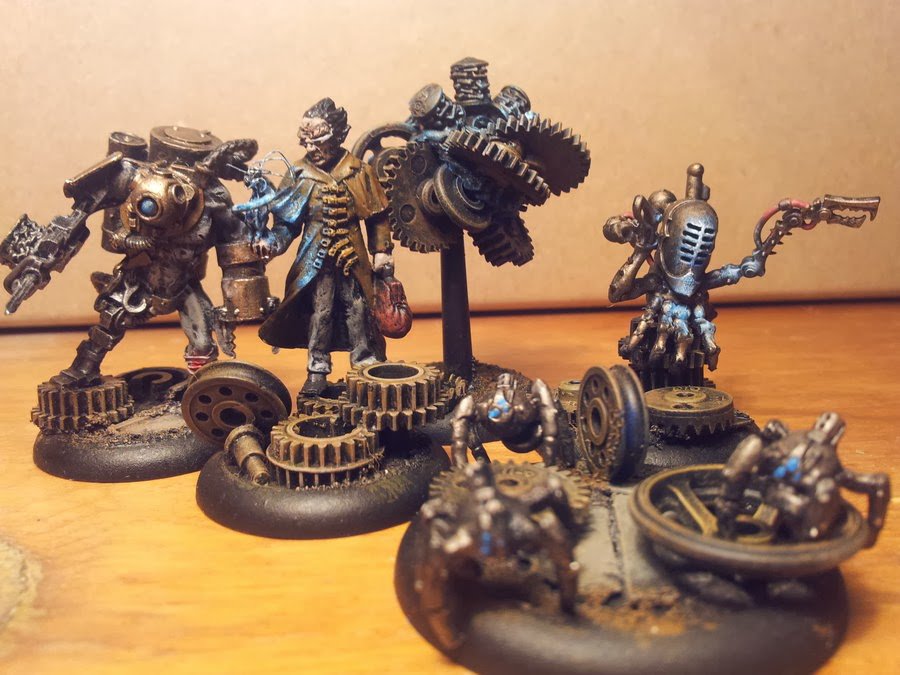
Again, I want to know what devilish pact this man made.
So here's Ramos again, but now, things are a bit different - rust covers everything, and the bases have been carefully put together to look like an industrial wasteland...but what might be the most fascinating thing, and the freakishly best bit of sculpting work I've seen is what he's holding - instead of the little flame that the model comes with, the guy who converted every model here to look fantastically different managed to sculpt a miniaturized Ramos into his hand. These figures are certainly yours, and some people like collecting the models never to use on the table, but just to play with and keep as pieces on your wall. Can't say I blame them, either.
What I'm trying to say is, in a very round-about way, is that Miniatures gaming's greatest weakness is also its greatest strength. You dedicate, you commit. Nine times out of ten, I'll find the person that has put the more effort into sculpting their models just perfectly, or getting that themed look just right. I mean, you can take a crew that's already based on children's nightmares and make it downright creepy/hilarious by painting up the killer teddy bears to reminisce the care bears. I'm serious, you can't make this stuff up. And I haven't even really gotten to the game play yet, have I?
This is a way this genre, or much of gaming in general, differs from books - books are, with a few exceptions, a finished product by the time you are reading it. The story has been written and told, the end results done. In the Wargame you are temporarily immersed. The decisions are yours, and in many of these games, you are playing with characters that have very defined traits and characteristics. Its easy to play them out in your head as they fire shots down alleyways, or launch a net of lightning across a laboratory. And unlike a video game, the story ends with your choices, your bad luck, or success or failure, until you scoop up the pieces and try again.
Something for Everyone: Style, Substance, Competition, Casual
This is a natural extension of what I was talking about before - I love story, and I love style. I love the fact that each individual war game can feel so wildly different. Malifaux is where I can walk Victorian streets that aren't-quite-right, where eldritch horrors might try to kill me, or magical creations meet the start of 20th century industry.
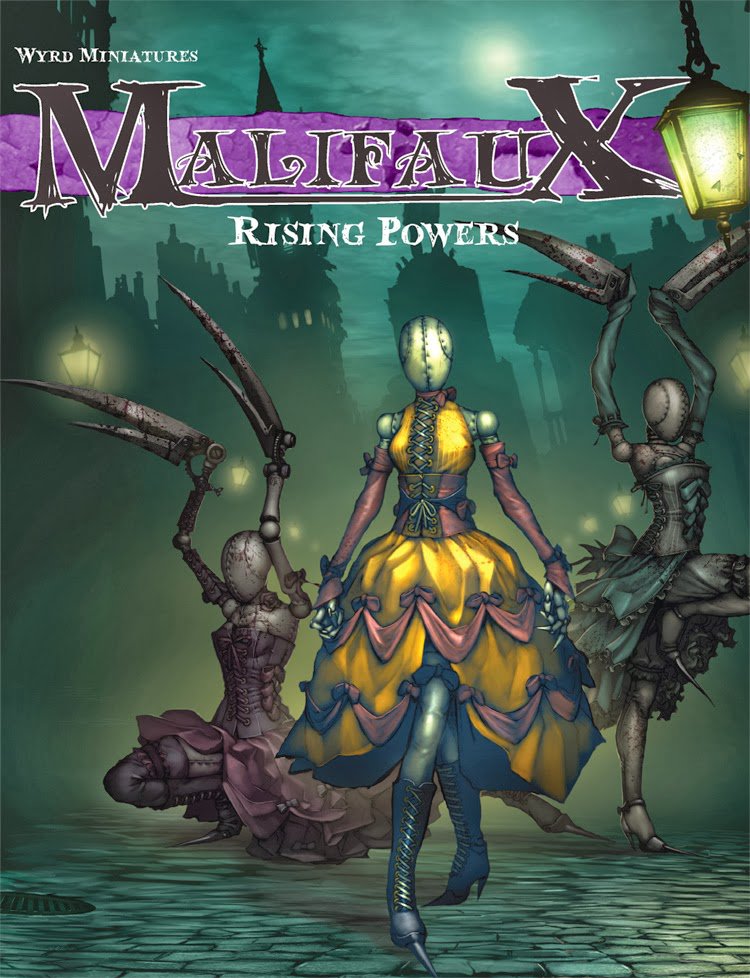
How are you ladies doing this even-......where are your faces?
Warmachine and its sister game, Hordes, is a world that is, well, embroiled by war, where giant mech-warriors were made with magic to beat heads in, fueled by powerful sorcerers. Infinity is a game that is set in the near future when humanity has gone to space, and started to explore both alien life and new technology, war becoming intense shootouts in city streets and sky-tops. MERCS is a near future that's a little bleaker, where Corporations rule, and the world constantly runs off mercenary kill teams fighting for rights and patents where countries used to stand... and Warhammer 40K is ridiculous.
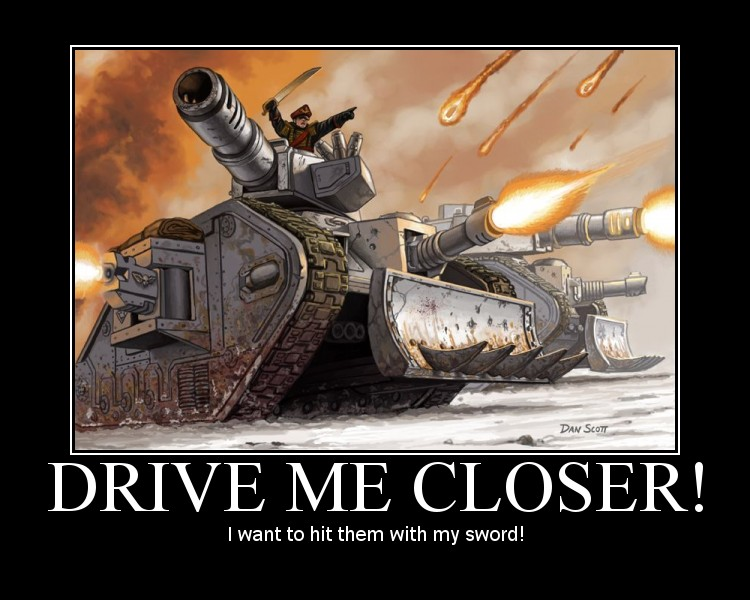
You think this is a good meme - but then you realize that this is a viable strategy in a game set in 40,000+ AD...
There is something here for everyone. Its not just about the game selection either, its about the sheer amount of different ways you can play each game. Yes, many of these games have a very competitive element to them, but remember that you make your own army lists every time, from dozens of choices. Its much fun sometimes to say "I could take a standard list of guardsmen with long rifles... but what if I decided to take a crew based around blowing itself up with dynamite instead?" You find out that in many of these games, this is viable, and hilarious. But you'll also find in a lot of the rule books there are rules for games that are purposefully mismatched. Why would you do that, you ask? Well, because it lets the game never get old. Instead of lining up gun-lines and firing across the field, what if your most valuable asset was being held in a prison dead in the center of some trenches? What if half your team arrived late to the party... but behind enemy lines? There's always fun ways to mix up what seems to be a very set-in-its-style genre at first glance.
Don't worry, its not all about the fancy artwork or the theme they've given to the models themselves - there's enough rules and exceptions and tricks to make you really sit down and get it right. Some people like to practice 'Mathhammer', which is when they determine the probability for their dice rolls for their army in advance, to try and get the best edge. Some people, like say, the dynamite team above, like playing armies based on chaos simply to have a good party, or in a purposeful way to discombobulate a practical strategy by their opponent.
There's an amazing game I'll review soon enough called Super Dungeon Explore, which is a-symmetrical in play - its more like a tabletop version of Gauntlet Legends and video game beat'em ups than anything else. One person plays as the evil lord of the dungeon...while 1-5 others band up as the anime heroes that are trying to score loot and kill enough things before they are overwhelmed. There's amazing games like Dystopian Wars, where you practice naval fleet techniques and the challenges of momentum. At my gaming store, there's often-times Warmachine games that are running on chess clocks to practice speed and timing for the growing tournament block there. Right next to it, one of the new casual players for Malifaux is simply trying to see how many corpses he can detonate in a single game.
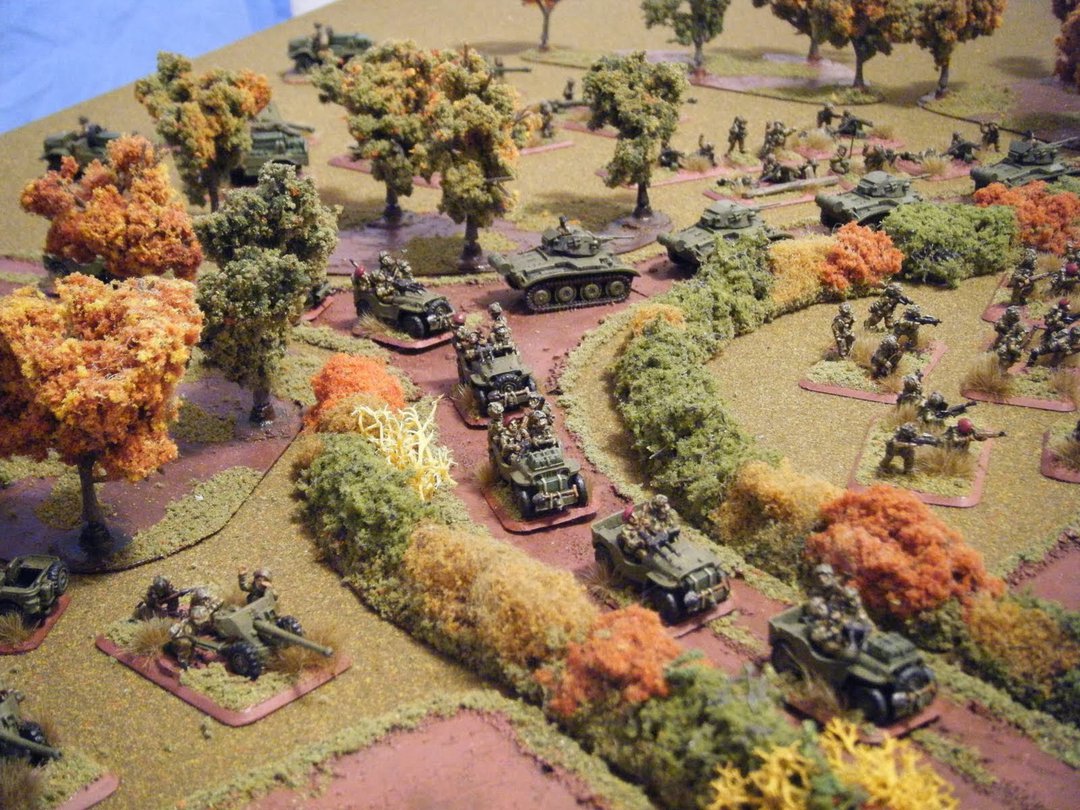
Space, Fantasy...World War II, there really is a War Game for Everyone.
The war gaming industry is diverse, and there is something here for everyone. I haven't even talked about historical war games, which are a huge subset of the genre. These are fun in a completely different way, where with some you can go purely fantastical, outlandish situations... here you can relive wars from the past, or decide to see if you can cheat history. I've seen people bring in fishing tackle boxes filled with tanks, and set up a beach-head assault before, fully painted, carefully detailed. The only reason I probably don't myself own a Russian tank line in Flames of War is because I don't have the funds to prep more shelves of space for this right now. That, and there are so many hours in the day - right now, I'm still gleefully avoiding zombie nurses and ladies of the evening in Malifaux.
Trash-talking is Hilarious
Now, this might be just me, but this is a bonus that's more than enough reason to try. Trash talking used to be a fine art-form, sort of like Shakespeare curses. The more original and rambling you can make them, the better. However, in my experience, the rise of the internet destroyed this skill-set. As your opponents became more random strangers, and even more so, people who you never see face to face, the ability to cat call or jeer, or even cheer on your rival or sworn nemesis has degenerated into lots of cursing. Usually really, really offensive cursing.
Social gaming in the first person perspective, where you are forced to butt heads from across the table, brings that back in a huge way. Again, because of the restrictions this game style brings, it actually benefits. War games require a social setting where people can meet on neutral ground. It requires the ability to be civil space. And over time, you know your opponents, not just their armies. You know their tricks, their thought processes...you can mock them as their attempt to snipe your leader fails yet again... or high five them when that spell-casting trick they've been trying to figure out finally works on the tenth try. You learn how to play against a particular person as much as their army; you often start learning about what's going on in their lives outside the games you play.
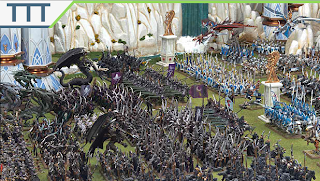
"Only using one dragon against me this week? Chump.""Yeah, well...my kid decided to eat one of its wings.""...Oh. Well, that's terrible. His name's Jim, right?"
When you beat them three times in a row, you have a great opening line the next time you throw down to play. When they finally beat you after that streak, you know they deserve some mocking laughter of their own. One of the things almost all table-top games benefit from is the fact that you are usually looking across the table at another face, and not at a screen.
It's Fun, Dammit!
Do I need to explain this? Sometimes, seeing your army of space-elf spirits trapped in giant mech-warrior shells which distort gravity with their weapons steamroll through a group of alien bugs is just what you need in a day.
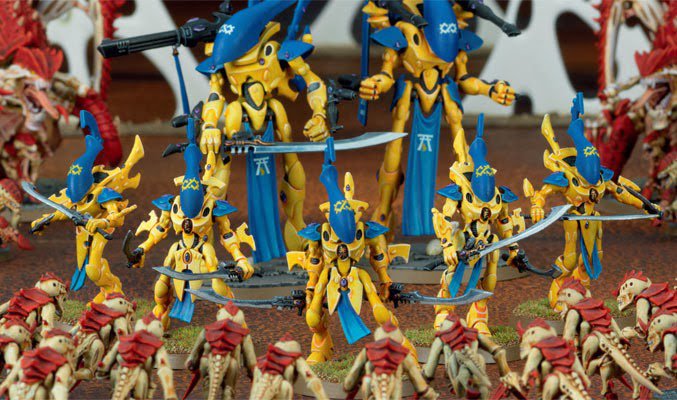
This looks about even, right?
Maybe its time I tried to reign this all back in, because I could keep going...and I'll be honest, I could fan boy for pages and pages for most of the games I've listed above already. What it comes down to though, is this - War gaming...miniatures gaming, is a style of gaming that looks and feels outdated as the consoles keep rolling out, and our society keeps digitizing more and more. Its almost for this reason that I love Miniatures gaming so much - when you take the time to sit down and commit to something like this, it really makes you stop and think, and let it suffuse you.
I love me some Halo, and trust me, I have many, many fond memories of sniping, or attempting stupid runs with my friends in vehicles...but try as I might, even though I've been playing that series off and on since 2004, I can very rarely pick out singular moments of multi-player I remember. I've been playing Malifaux since early 2011, and I have dozens of stories I can pick out of hilarious, stupid, ridiculous things that happen in closely matched games with friends. Its the concoction, the crucible of playing a strongly thought out game, the tension of a drawn out match, the effort and commitment you've put towards making your own miniatures yours - somewhere in the middle of that, magic happens. Its for this, that I think I'll be playing with little bits of plastic and metal on tables until I'm old and grey.
-Wyatt